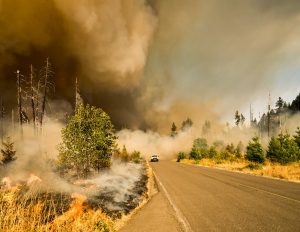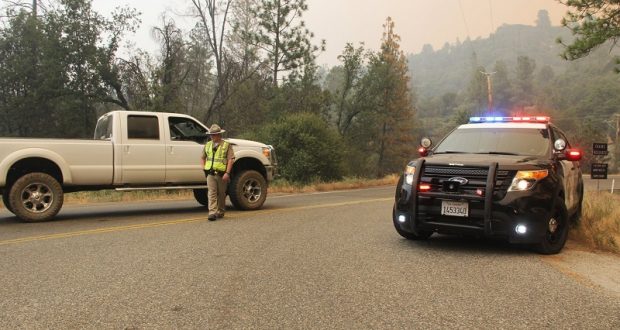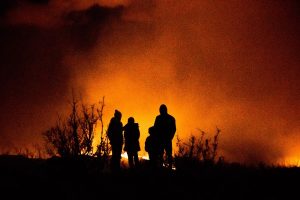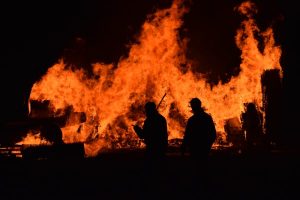MOUNTAIN COMMUNITIES — Yes, it’s the dreaded word wildfires. I’m sure it feels like the wrong time of year to be talking about wildfires for many people, but for me, it’s a year-round conversation as a reporter for our Mountain Communities. One of my responsibilities is to monitor and report on wildfires and emergencies on social media.
Many in our community have been evacuated for wildfires more times than they would like to remember. Evacuations have forced community members to drive through the flames because there was only one way out. Areas with one-way in and out are still very much the case for citizens of our rural communities.
Recently, Assembly Member Jim Patterson released the following statement on an assembly bill that is geared towards escape routes in rural communities like ours:
“Deadly, fast-moving wildfires are now the norm,” Patterson said. “We have to do everything in our power to make sure we are prepared to get people out as quickly as possible. If that means building a new exit route, we shouldn’t have to wait for a CEQA report to be completed.”
AB 1154 would eliminate California Environmental Quality Act (CEQA) requirements for projects that build additional escape routes in high fire-hazard zones. The exemption would apply to neighborhoods identified by the Board of Forestry and Fire Protection where a second access road is needed. Newly released reports show many mountain and foothill neighborhoods only have one exit route.
AB 1154 will be heard next in the Assembly Appropriations Committee.
What is AB 1154?

Image by Marcus Kauffman.
Assembly Bill 1154 was introduced to the California Legislature on February 18, 2021, by Assembly Member Patterson (District 23) and coauthored by Assembly Member Megan Dahle (District 1).
AB 1154 is intended to streamline the process of creating additional exit routes for rural subdivisions that have only one egress or escape route. The goal is to establish conditions that would be in place so that the time-consuming process of waiting for a CEQA environmental report to be completed could be circumvented for areas that have already been declared at risk by the Board of Forestry (BOF) and Fire Protection. The BOF has been identifying those areas since 2018, and there are several in the Madera County foothills and mountain communities, and Mariposa County, as shown on this map.
Subdivisions: Referenced as any group of more than thirty dwelling units, they are identified with the help of local jurisdictions. If they meet relevant criteria as outlined in Section 4290.5 of the California Public Resource Code, those subdivisions are surveyed for modes of ingress/egress and other fire safety factors.
AB 1154 is very similar to AB 394 which Governor Gavin Newsom had vetoed in 2019, but with some changes. Considering the devastating fire season in 2020 and 2021, the bill is even more paramount now.
The Next Steps
Now that AB 1154 has been approved in the Assembly Natural Resources Committee, it is headed to the Assembly Appropriations Committee, where it will be read with its amendments. Also included will be the 13 conditions that a project would have to meet to be considered eligible to bypass the CEQA environmental report. Included in the 13 conditions are that a project cannot contain wetlands, harm endangered species or protected native plants, affect known archaeological, historical, or other cultural resources, etc. From there, the bill would continue through the process of being amended and hopefully approved so that it can continue its journey to the Governor’s office. If AB 1154 is ultimately passed, it will be considered valid through Jan. 1, 2029.
You can read more about AB 1154 here, including its history and the full text.
Community Response
Tom Wheeler, Madera County District 5 Supervisor, agrees with the purpose of AB 1154 wholeheartedly, “Assemblyman Jim Patterson’s AB 1154 bill will really help us build these escape routes for high danger areas in the SRA (State Responsibility Area), which is most of the eastern area of Madera County. Including areas like John West Road, Cedar Valley Road, Cascadel Road, and many others that have no escape routes. I’ve been working with CalFire, County Staff and local residents in these areas for many years trying to improve their safety when these disastrous fires start in our area. The cost of CEQA reports are what stop some of these escape routes by being cost prohibitive. I really hope that both sides of the table in Sacramento support this bill, AB 1154.”
Daniel Ching, principal of Minarets High School, believes that “It’s important for the state to look to its local communities to implement safety precautions for high fire danger areas. Providing opportunities for communities to increase safety by evaluating ingress and egress routes could provide a more rapid and efficient response for evacuees. As long as the state entities work with property owners to ensure these routes maximize safety but minimize infringements to property owner rights, this bill could yield positive results for community safety. Often, bills are passed with a focus on safety, but the impact of using easements causes a change in the landscape, and privacy of the community is negative. I sure hope to see local level input implemented if this bill is passed because local property owners have the best knowledge of their communities.”
Christel Hays, owner of Oakhurst Business Center and Cascadel homeowner agrees that “Adequate escapes routes for all of us in the community are vital and reasonable legislation that reduces the red tape to build them will provide an extra safety net that might not only allow for better escape, but also for better access to fight fires.”
Robert (Bobby) Macaulay, Chief of Staff for District 5 and candidate for Madera County Supervisor, 5th district, commented “evacuation routes in communities like John West are a top priority for me. As Chief of Staff for District 5, I have helped staff identify a grant opportunity to get it done. We will know if the project will be funded later this winter.” Macauley reiterated the importance of evacuation routes to our local representatives.
Beau Campbell, candidate for Madera County Supervisor, District 5, on the other hand, replied that “Perhaps there should be more consideration given to removal of hazardous trees and years old overgrowth of the brush of fallen trees. In a fire, they just act as an accelerant. I would sure hate to see the State or the Counties involved in doing anything that would add to unsafe conditions rather ensuring that suitable and safe evacuations do in occur.”
This does bring up a perfect point as well because the problem of wildfires is a highly complex issue with many components. AB 1154 is only one of the bills that address the issues and is not only crucial regarding evacuations but also in keeping the conversation open at a level where action can happen for our communities and our state.
Recently, when asked, Mark Reed, candidate for Madera County Supervisor, District 5, said “We have been simply lucky we have not had a repeat of the 1961 Harlow Fire, the fastest-moving (wild)fire on record. He went on to say that “The frustration factor is extremely high. What’s frustrating is the lack of action by these elected officials to create a strategic escape plan and implement it. It’s been 61 years since the Harlow fire and they are now passing this bill (AB 1154). As your next county supervisor it will not take me 61 years to do the right thing.”






